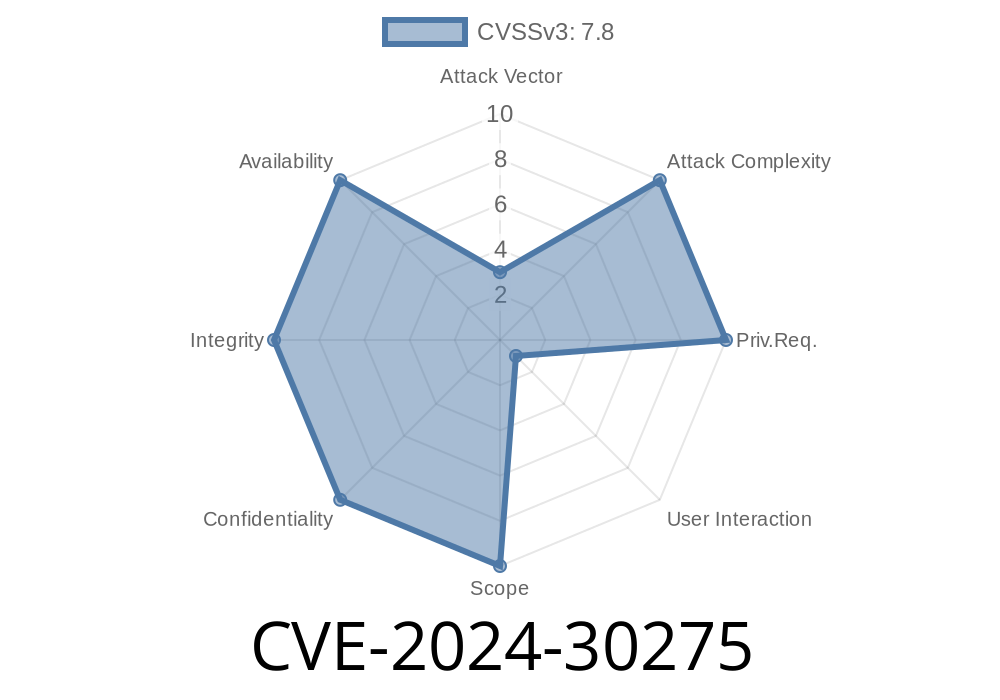Adobe Aero makes creating AR (Augmented Reality) scenes easier than ever. But in early 2024, security researchers found a serious vulnerability: CVE-2024-30275. This security issue impacts Adobe Aero Desktop, versions 23.4 and earlier, and exploits a "Use After Free" bug that can allow hackers to run whatever code they want – just by convincing you to open a tainted file. Let's break down how this works, how severe it is, and how you can protect yourself.
What is CVE-2024-30275?
CVE-2024-30275 is a classic Use After Free (UAF) vulnerability found in Adobe Aero Desktop’s codebase. UAF bugs pop up when a program wrongly continues to use memory that’s already been freed (i.e., deallocated). If attackers know about this, they can craft files that make the program execute malicious code in memory – right on your computer.
Impact: Full code execution as the logged-in user
- CVE page: NIST NVD Entry
- Adobe advisory: APSB24-23
The program accesses a memory area it already freed ("use after free")
- Because of the attacker’s tricks in the file, this memory now contains code put there by the attacker.
No special privileges needed — just your regular account is enough.
- Common attack vector — attackers just need you to open a file, no system weaknesses or passwords involved.
Exploit Details: How Attackers Might Abuse It
Adobe's advisory and the NIST entry don't give exploit code, but based on public "Use After Free" exploitation techniques, here's a simplified version of what hackers do:
1. Create a malicious .aero file designed to trigger the UAF in the program's project file parsing code.
2. Fill freed memory with shellcode (the actual malicious instructions) by abusing attachments or file metadata features in the Aero file.
3. Trigger the use-after-free by including invalid references or out-of-order objects in the file format.
Here's a *very simplified* C-style pseudocode to show what happens under the hood
// Vulnerable code (conceptual example)
Object *obj = new Object();
free(obj); // mistakenly frees memory early
if (user_file.has_special_token()) {
obj->do_something(); // UAF: object already freed!
}
An attacker arranges the file so that the memory used for obj is filled with their code; so calling do_something() actually runs their code.
Sample Exploit (for demo purposes, not weaponized!)
Suppose the attacker puts a buffer in the file at a known offset. In memory, after free, this buffer is repurposed. The exploit can look like this in memory:
| Legit Data | ... | SHELLCODE | ... |
^
freed pointer now points here
So when Aero processes the corrupted file, it jumps to the shellcode.
Public exploit code is not available as of writing, but similar attacks have been documented. For example:
- Understanding Use After Free
- Practical UAF exploitation writeup
Mitigation & Protection
- Update immediately: Adobe fixed the bug in Aero Desktop 24. and later. Get the newest version from Adobe's official site.
References & Further Reading
- CVE-2024-30275 entry on NIST NVD
- Adobe Security Bulletin APSB24-23
- OWASP: Use After Free
Conclusion
CVE-2024-30275 in Adobe Aero Desktop is a textbook example of how small programming mistakes can lead to critical system compromises. Since attackers only need to convince you to open a file, always be careful with what you download – and keep your software patched!
Stay safe: update your Adobe Aero Desktop now and avoid unexpected AR surprises.
*This post is exclusive and was written for educational awareness. Do not use this information for malicious activity.*
Timeline
Published on: 05/16/2024 09:15:10 UTC
Last modified on: 08/02/2024 01:32:07 UTC
